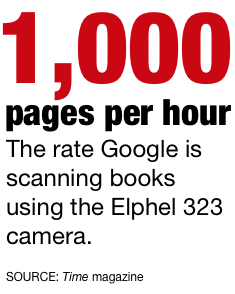Can Universities Legally Scan Their Library Books?
Is scanning library books legal? If only the answer were so simple.
It begins with Google, the search engine giant that appears to be on a mission to index all of the world’s data. Books are a good place to start, given the enormous amount of unsearchable information they contain.

The indexing project launched in 2004, and since 2005, Google has been partnering with libraries at colleges such as Stanford, Princeton and Harvard to take on the monumental task of digitizing all of the words in all of their library books.
Copyright issues have surrounded the project since the beginning, though Google insists that it will make the full text of books available only if they are no longer protected by copyright. For the 73 percent that are still protected, searches will allow users to find books and read samples of text, if approved by the publisher. If the publisher refuses, users will still be able to see a snippet of the content, which will be limited to just two or three sentences.
Basically, Google points out that it's creating an index of everything in the books, not acting as a substitute for the books. Thus, the purpose serves to make useful information more widely available (which likely can increase the demand for the books, by helping users find new books).
It’s a controversial and complicated project that is generating discussion about the future of digital content at colleges and elsewhere. While the copyright implications are understandable, Google makes an excellent case for itself.
So why has such a universally useful tool become so controversial? Because some in the publishing community question whether any third party should be able to copy and index copyrighted works so that users can search through them, even if all a user sees is the bibliographic information and a few snippets of text, and even if the result is to make those books widely discoverable online and help the authors and publishers sell more of them.
Copyright law is supposed to ensure that authors and publishers have an incentive to create new work, not stop people from finding out that the work exists. By helping people find books, we believe we can increase the incentive to publish them. After all, if a book isn't discovered, it won't be bought.
The most recent lawsuit regarding this matter is currently stalled while a judge further examines the case. In the meantime, Google’s project continues. Learn more about it here.








